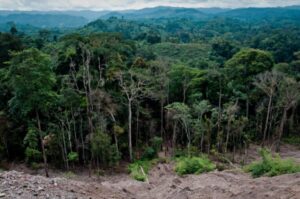
Role of Women in Climate Resilience in Delhi’s Informal Settlements
Rebeka Shaw, Aayushi Rai, Niyati Kotiyal, Ravi Ranjan Kumar, Kushi N Jain Introduction India is confronting a growing climate problem. Anthropogenic climate change is responsible for 37% of heat-related deaths worldwide, and the nation has routinely broken heat records. According to the Indian Meteorological Department (IMD), these deaths increased by 34% between 2013 and 2022 in contrast to the decade before. At the centre of this dilemma lies Delhi, a heavily crowded city with over 33 million inhabitants that is characterised by severe climate variability, chronic air pollution, and inadequate infrastructure. The majority of this exacerbated situation is concentrated in Delhi’s informal settlements, which are home to nearly 10 million people, in a city that is itself ranked among the most polluted in the world by the World Health Organisation (WHO). Women in these informal settlements are vulnerable on several levels in this situation. They are disproportionately impacted by climate-induced shocks like heatwaves, droughts, and floods since they are the major carers and managers of the household care sector. However, despite playing a crucial role in preserving the livelihoods of households and communities, they are often excluded from official climate decision-making processes. Systemic hurdles including restricted access to technology, education, financing, and land further exacerbate this marginalisation. Women and girls, who are more likely to experience violence, exploitation, and instability, makeup 80% of those displaced by climate disasters worldwide. However, despite these challenges, women are more than just helpless victims. Their leadership abilities, resilience, and local knowledge are crucial to adaptation initiatives. The important but frequently unseen roles that women play in enhancing climate resilience in Delhi’s informal settlements are highlighted in this article. Along with providing a detailed study of both grassroots action and structural gaps, it also looks at the larger policy frameworks that support or undermine their activities. Policy Landscape: Multilevel Governance for Gender-Inclusive Climate Action To understand women’s roles in climate resilience, we must first examine the multilevel policy frameworks that shape their participation. While the global and national policies reflect a growing recognition of gender equity in climate action, the extent to which these policies translate into effective, local implementation remains varied. Globally, the Paris Agreement and the Sustainable Development Goals (SDGs)- especially Goal 5 (Gender Equality), Goal 11 (Sustainable Cities), and Goal 13 (Climate Action), underscore the importance of inclusive and gender-responsive urban planning. UNFCCC’s Gender Action Plan and CEDAW’s General Recommendation No. 37 further emphasize women’s leadership in disaster risk reduction and climate governance. Mechanisms like the Loss and Damage Fund created at COP27 provide financial support to vulnerable communities, including urban slum dwellers. At the national level, India’s National Action Plan on Climate Change (NAPCC) integrates gender considerations across key missions. Locally, the Delhi State Action Plan on Climate Change (SAPCC) encourages women-led adaptation strategies in areas like water conservation, waste management, and disaster preparedness. The Mukhyamantri Mahila Samman Yojana (2024) adds another layer by providing institutional and financial support to strengthen women’s climate resilience and livelihood security. These frameworks lay the foundation for gender-inclusive climate action. However, to gauge their real impact, we must shift our focus to the urban peripheries- Delhi’s informal settlements, where the struggle for survival and resilience plays out most vividly. Situating the Crisis: Delhi’s Informal Settlements as Climate Hotspot Delhi’s informal settlements are situated at the nexus of urban vulnerability and environmental stress. These neighbourhoods experience disproportionately higher impacts from extreme heat, flooding, and pollution. The city recently recorded temperatures as high as 52.9℃ in May 2024, exacerbated by the urban heat island effect and poor housing infrastructure, particularly in slum areas lacking proper ventilation and insulation. The projected increase in Delhi’s average annual temperatures by 1–4℃ by 2050 translates into a 4% rise in mortality for every degree above 29℃. Additionally, monsoon variability and heavy rainfall lead to flooding and water contamination, especially in areas close to the Yamuna River. These events result in disease outbreaks, loss of livelihoods, and increased health risks, further destabilizing vulnerable communities, particularly women, who already shoulder the burdens of domestic care and resource provisioning. These lived experiences underscore the urgency of centring women in climate adaptation efforts. Fortunately, several grassroots initiatives have emerged that do just that. MAP 1: Location of the Area of Study Source: Compiled by the Authors Women in Action: Grassroots Leadership and Community Resilience In response to the mounting climate challenges faced by women in these vulnerable communities, organizations like the Mahila Housing Trust (MHT) have played a critical role in empowering them to lead climate adaptation initiatives. MHT’s work spans climate education, leadership training, and infrastructural interventions tailored to the everyday realities of women in informal settlements. 1. Climate Education: Using tools like games and visual media, MHT demystifies climate science for women, focusing on everyday impacts- such as water shortages, disease, and heat waves. 2. Clean Energy and Cool Roofs: Through partnerships with electricity companies, MHT facilitates the installation of solar panels and promotes cool roofs- affordable solutions that significantly reduce indoor heat and energy bills. 3. Air Pollution Advocacy: In collaboration with Help Delhi Breathe (HDB), MHT has engaged female construction workers in resettlement colonies like Bakkarwala and Sawda Ghevra to raise awareness about air pollution. These women are not only learning about the hazards but actively mobilizing for clean air and influencing local policy. Complementing the efforts of organizations like MHT, individual leaders have also emerged from within communities to drive change. One such example is Shipra Narula, a former youth volunteer who began her journey with Swechha’s Yamuna cleanup campaign during her undergraduate years. Moved by the sight of the heavily polluted river, she transitioned from participant to leader, gradually expanding her work into city-wide afforestation projects such as Monsoon Wooding, which has planted thousands of native trees across Delhi-NCR. Shipra’s climate leadership is rooted not in formal authority but in lived experience and community action. She has worked closely with slum communities to improve access to clean water and sanitation, while also mentoring young people, especially girls, through









